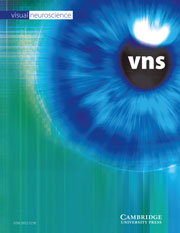Article contents
Calcium-induced calcium release and calcium buffering in retinal horizontal cells
Published online by Cambridge University Press: 30 January 2003
Abstract
Calcium plays an integral role in intracellular signaling and process control in neurons. In the outer retina, it is a key component to the phototransduction cycle and neurotransmitter release in photoreceptor and bipolar cell terminals. It also contributes to the responses of horizontal and bipolar cells. In the dark, horizontal cells are depolarized and calcium enters via calcium permeant AMPA receptors and voltage-activated calcium channels. As a result, horizontal cells must be capable of handling high calcium loads without sustaining damage. The aim of this study was to examine the components determining the intracellular calcium levels in H2 horizontal cells in the retina of white bass. Calcium responses were evoked in isolated cells by depolarizing voltage steps and monitored by conventional imaging techniques. The responses consisted of two components: calcium entry through voltage-gated calcium channels and subsequent release from intracellular stores by calcium-induced calcium release (CICR). Under control conditions, changes in calcium levels reached 541 nM on average from a basal level of 60 nM. When release from CICR stores was blocked with ryanodine or dantrolene, calcium levels barely reached 180 nM. The threshold level needed to trigger CICR was dependent on the duration of the applied depolarization and increased in response to shorter pulses.
Information
- Type
- Research Article
- Information
- Copyright
- 2002 Cambridge University Press
- 9
- Cited by

